 BTCC
BTCC
Visit BTCCTired of waiting for KYC verifications just to start trading? As one of the world’s longest-running exchanges, BTCC offers a no-KYC, high-liquidity trading platform with some unique perks. Users can trade not only cryptocurrencies but also stocks, commodities, and forex using crypto (USDT) – all without mandatory KYC for most users.
Rating
86Location
Hong KongContract types
USDT, COIN-MMaker fee
0.025 %Taker fee
0.045 %Max leverage
500xUS allowed
NoDeposit methods
Crypto, Bank TransfersAverage funding fee (BTC)
-Table of contents
- BTCC Exchange Review 2025 – Is This No-KYC Crypto Exchange Worth It?
- TL;DR
- What is BTCC?
- Is BTCC Safe and Legit?
- BTCC Key Features and Products
- Spot Trading on BTCC
- Futures Trading (Crypto & Tokenized Markets)
- Copy Trading
- Demo Trading for Practice
- Other Notable Features
- Fees and Limits on BTCC
- Using BTCC: Getting Started
- BTCC vs Other Exchanges
- Is BTCC Right for You?
- Frequently Asked Questions (FAQs) about BTCC
BTCC Exchange Review 2025 – Is This No-KYC Crypto Exchange Worth It?
| Pro's | Con's |
| No account approval wait (no KYC needed) |
Unverified withdrawal limit (~$10k/day) |
| High liquidity and deep order books | Less regulated oversight |
| Trade stocks, gold, oil with USDT (unique) | Not officially available in some regions |
| 10% deposit bonus (instant, no strings) | No built-in staking or earn features |
| Up to 500× leverage on crypto futures |
Spot fees (0.3% taker) higher than some competitors |
TL;DR
|
Feature |
Summary |
|---|---|
|
Best for |
Traders seeking privacy (no-KYC), high leverage, and diverse markets (crypto + stocks) |
|
Available in |
100+ countries (Worldwide, incl. US & Canada) |
|
Trading pairs |
150+ cryptos, plus tokenized stocks, commodities & forex pairs (USDT-settled) |
|
Markets |
Spot, Perpetual Futures (crypto & tokenized assets), Copy Trading, Demo Trading |
|
Fees |
Spot: ~0.2% maker / 0.3% taker Futures: 0.025% maker / 0.045% taker |
|
KYC |
Not mandatory (crypto-only up to $10k withdrawal/day); required for fiat or higher limits |
|
Deposit Bonus |
10% up to $10,000 for first deposit (via Whaleportal link) |
What is BTCC?
BTCC is a centralized cryptocurrency exchange originally founded in Shanghai in 2011, making it one of the oldest crypto exchanges in the world. It was initially known as BTC China and was one of the “Big Three” Chinese exchanges alongside Huobi and OKCoin. Over 14 years of operation, BTCC has evolved into a global platform serving millions of users across 100+ countries.
After China’s regulatory crackdown, BTCC relocated and expanded internationally – it’s now registered and licensed in the UK, Canada, and even the USA (FinCEN Money Services Business license). Today, BTCC is best known for its focus on crypto futures trading, though it also offers spot markets and innovative products. The exchange specializes in USDT-margined futures and even coin-margined futures, letting users settle contracts in crypto.
Uniquely, in 2022 BTCC launched tokenized futures for commodities and stocks, so traders can speculate on traditional markets like Gold or Tesla using USDT instead of fiat. This blend of crypto and TradFi markets sets BTCC apart as a hybrid trading platform. Despite its longevity, BTCC has a relatively modern and user-friendly interface. The platform supports desktop web, a full-featured mobile app, and even integration with MetaTrader 5 (MT5) for advanced traders who prefer deploying professional software tools.
With over 7 million registered users as of Q1 2025, BTCC has built a large community and substantial liquidity over the years. In the first quarter of 2025 alone, BTCC saw a total trading volume of $815 billion (including $720B in futures).
Is BTCC Safe and Legit?
When it comes to safety and legitimacy, BTCC scores quite high. Here are the key points to know:
- Regulation & Licenses: BTCC operates under several regulatory registrations, adding to its credibility. It’s registered with FinCEN in the US and FINTRAC in Canada, meaning it’s licensed to provide crypto services in those jurisdictions. The platform has also obtained a crypto license in Europe (Lithuania).
- Security Track Record: BTCC has maintained an impeccable security record since its inception. Remarkably, the exchange has never been hacked, with user funds being protected thanks to measures like multi-signature cold wallet storage, 2FA login security, asset segregation, and withdrawal protections. Furthermore, BTCC doesn’t engage in risky practices like using customer funds as collateral; it follows a one-to-one reserve policy. In fact, at the start of 2025, BTCC began publishing monthly Proof of Reserves reports, verifying that it holds more than 100% of customer assets (May 2025’s audit showed a 152% reserve ratio overall).
- User Protection Features: BTCC has established a Risk Reserve Fund (~$15 million) to cover extreme events, such as negative account balances or system issues. In Q1 2025 alone, this fund compensated 280,000 traders during high volatility.
- Considerations: Because BTCC doesn’t require identity verification for basic crypto trading, it operates in a more relaxed regulatory environment compared to, say, a U.S.-based exchange like Coinbase.
BTCC Key Features and Products
BTCC offers a comprehensive suite of trading features that cater to both beginners and advanced traders. Below, is a break down the platform’s key aspects:
Spot Trading on BTCC
For individuals that prefer straightforward crypto buying and selling, BTCC’s spot market has them covered. The exchange supports 150+ cryptocurrencies, including most major coins (BTC, ETH, XRP, ADA, etc.) and altcoins. One can trade these against USDT and sometimes other base currencies. Liquidity on main pairs like BTC/USDT and ETH/USDT is strong, with high daily volumes ensuring market orders execute smoothly without significant slippage.
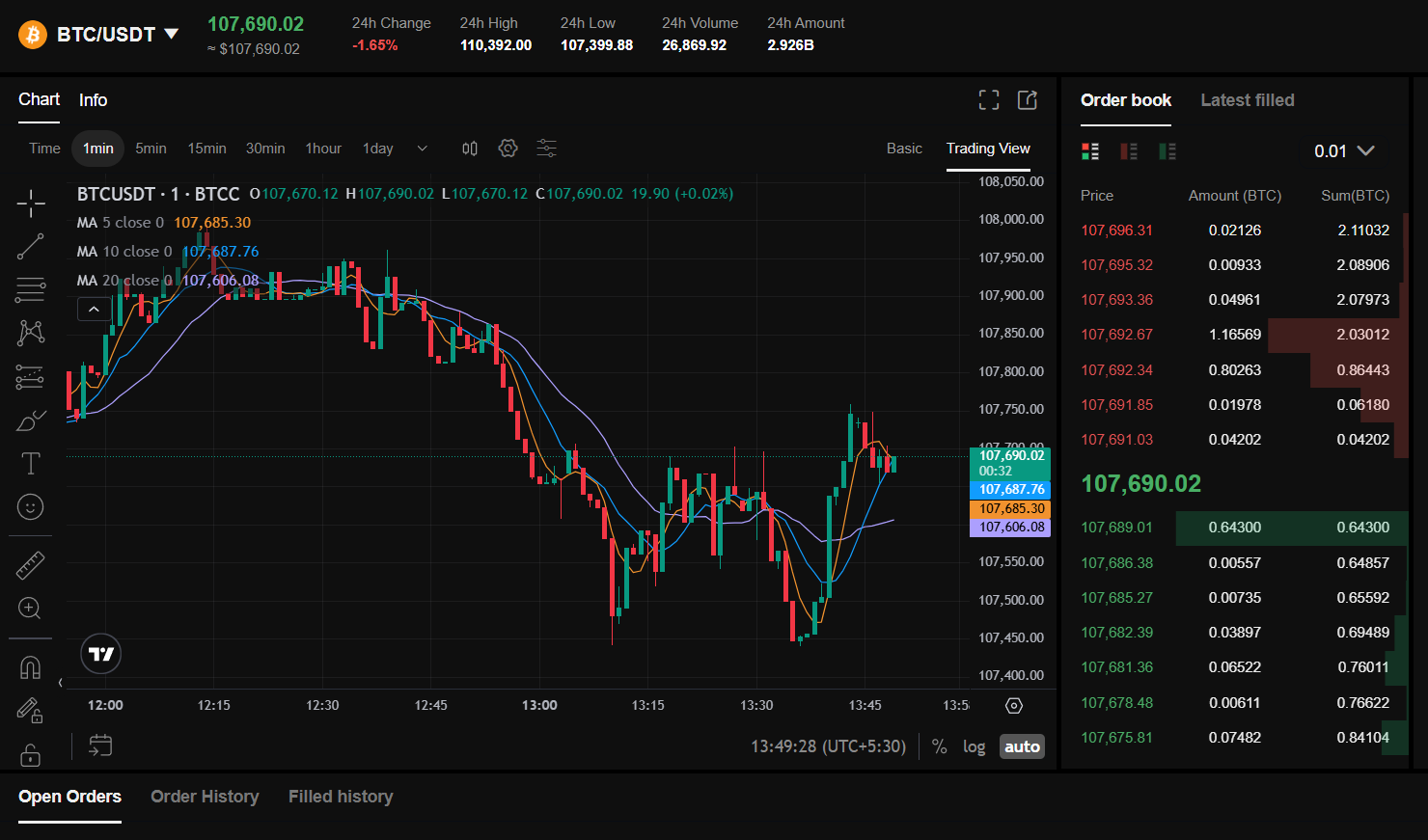
Spot trading on BTCC uses a familiar interface with TradingView charts, depth charts, and various order types (limit, market, stop orders, etc.). The UI is clean and beginner-friendly, even if one is new to crypto, they can easily select a trading pair, input the amount, and hit the ‘buy or sell’ button.
One thing to note is that while fiat currency deposits are supported (via credit card or bank transfer), they require KYC verification.
Futures Trading (Crypto & Tokenized Markets)
Derivative trading is where BTCC truly shines, as the platform was one of the early adopters of crypto futures and continues to offer a robust futures trading experience. On BTCC users can trade USDT-margined perpetual contracts on over 60+ popular cryptocurrencies, including BTC, ETH, XRP, DOGE, SOL and many more.
These perpetual futures work similar to those on other platforms, i.e. a trader post’s their margin (in USDT) and trade contracts that track the underlying crypto’s price, with the position rolling over continuously (funding fees apply periodically to keep price in line with spot). One standout feature is the leverage on BTCC. Traders can use up to 150×, 200×, and even 500× leverage on certain crypto futures – an extremely high leverage ceiling.
BTCC even advertises 500× on some pairs, which is one of the highest in the industry. However, high leverage can amplify profits but also massively amplifies risk (i.e. a 500× position can be liquidated by a price move of just 0.2%).
BTCC’s futures interface is intuitive. Users can choose between “USDT-Margined” or “Coin-Margined” contracts. In USDT-margined, all PnL is settled in USDT (most common). In Coin-margined mode, the margin and settlement are in the cryptocurrency itself (for example, an investor might post BTC as margin and earn BTC on a BTC futures trade).
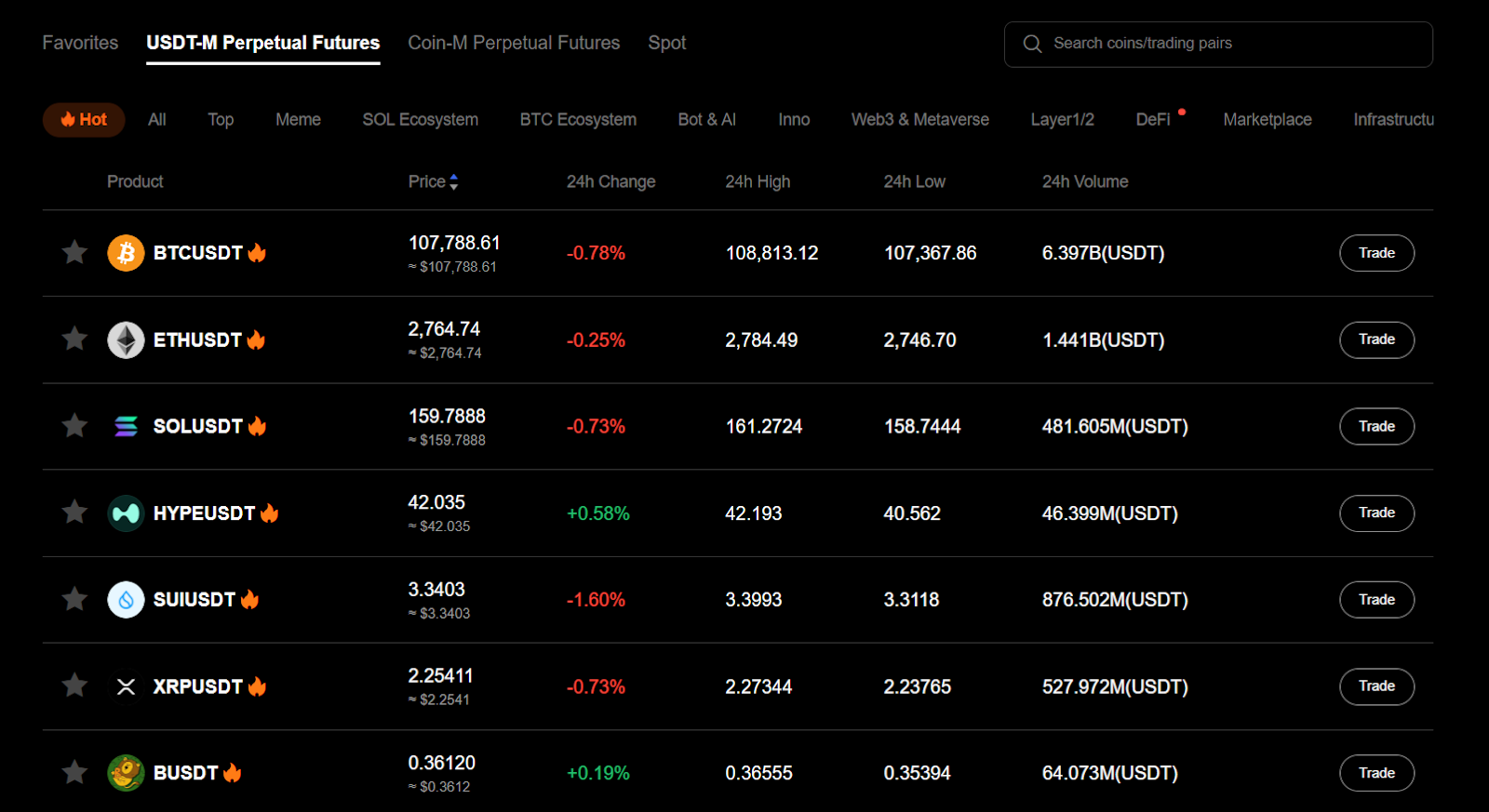
This dual option is great for traders who want flexibility in how their profits are paid out. The platform supports both isolated and cross-margin modes for risk management. Isolated margin means each position’s margin is separate (a loss won’t drain your whole account beyond what you put for that trade), whereas cross margin shares margin across all positions with the same settlement currency – useful if an investor wants to reduce chances of liquidation by drawing from a larger pool of funds.
Another major advantage is that liquidity on BTCC’s futures is high with order books for top contracts being deep, and large trades executing with minimal slippage. In fact, BTCC claims to be among the top exchanges by futures volume globally. For traders, this means they’re less likely to encounter any scary “scam wicks” or sudden spikes that sometimes plague illiquid exchanges.
Tokenized Stocks & Commodities with Crypto
One of BTCC’s most unique offerings is the ability to trade traditional financial assets (stocks, commodities, forex) on its crypto-based futures platform. These are offered as “tokenized futures,” i.e. CFD-like contracts that mirror the price of assets like Apple stock or Gold, settled in crypto (USDT).
These markets function just like crypto perps wherein a person doesn't own the actual stock or commodity, but profit from their price movements. It’s a great way for crypto traders to diversify into TradFi markets without leaving the crypto ecosystem or converting to fiat (all without any KYC verification).
Copy Trading
For less-experienced traders or those who want a more hands-off approach, BTCC provides a Copy Trading feature, allowing users to automatically copy the trades of expert traders on the platform. . Essentially, top-performing traders (called “lead traders”) can share their strategies, and “copy traders” can allocate some of their funds to mirror the formers’ moves in real-time.
Furthermore, on BTCC’s Copy Trading page, users can find a leaderboard of strategy providers with metrics like their win rate, total PnL, ROI, and number of followers. Using these metrics, an individual can choose a trader to follow based on their past performance and risk profile.
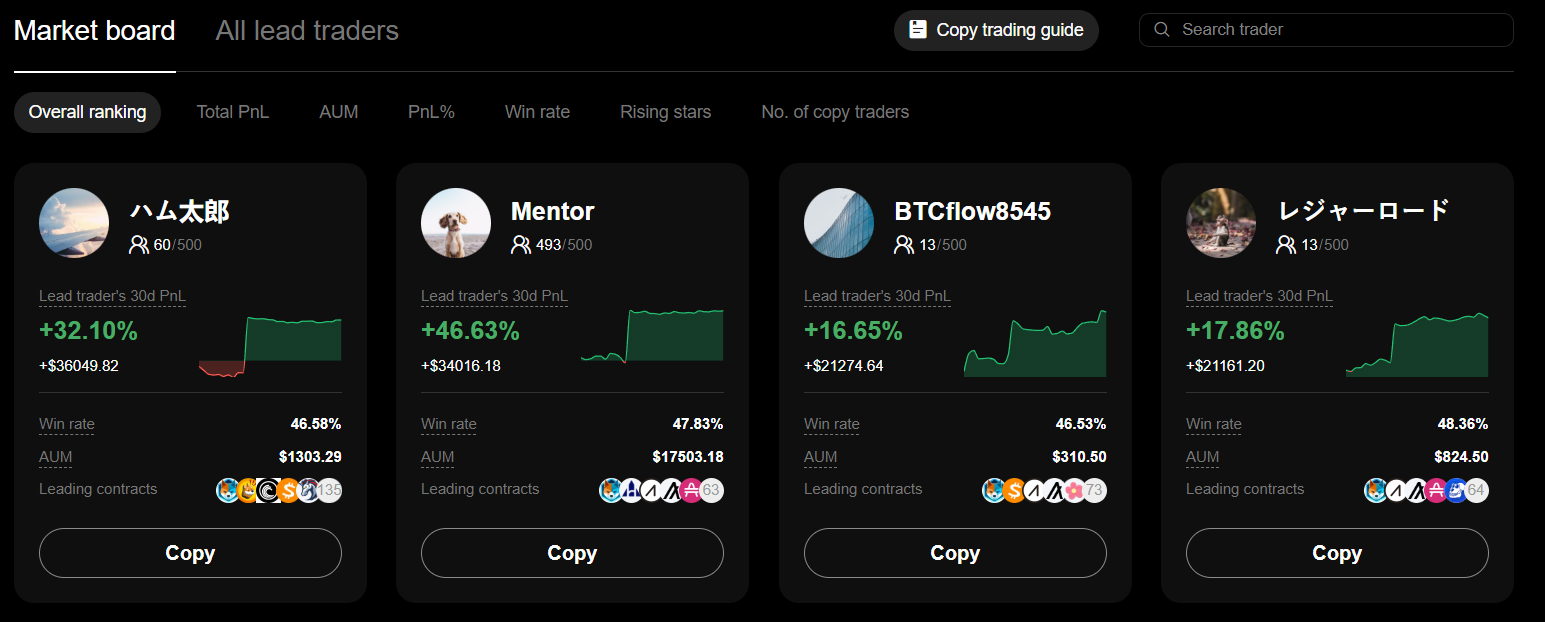
Also, BTCC lets individuals manage their risk profiles by setting either a Fixed Margin or Proportional Margin copy mode. For example, in proportional mode, if the lead trader uses 5% of their account per trade, the user’s account will also use 5% of their allocated funds per trade.
Lastly, BTCC’s copy trading has no extra fee to use, aside from the normal trading fees as some lead traders might take a share of profits as a commission (a common practice for copy trading platforms), but the platform itself primarily earns from the increased trading volume.
Demo Trading for Practice
For beginners, BTCC offers an excellent Demo Trading mode (paper trading). Every user gets a non-expiring demo account with 100,000 USDT in virtual funds by default. One can switch between Live Trading and Demo Trading with a simple toggle on the platform (even on the chart interface, there’s a button to enter demo mode).
This allows investors to practice trading strategies, test out the interface, or try copy trading without risking real money. What’s cool is that BTCC’s demo environment mirrors real market conditions with individuals having full access to the same futures contracts, leverage, etc., just using play money.
Other Notable Features
- Mobile App: BTCC has a mobile app for iOS and Android, which offers the full trading functionality on the go. The app is well-designed, providing real-time charts, easy order placement (all while supporting up to 150× leverage trading and security features like biometric login, etc.)
- MT5 Support: Advanced traders can connect to BTCC’s servers through the MT5 platform and trade using the advanced tools it provides (custom indicators, trading algos, etc.).
Fees and Limits on BTCC
Understanding fee structures is crucial for any trader and in this regard, BTCC’s fees are generally competitive, especially for futures traders, though spot fees are average.
- Spot Trading Fees: For regular users (VIP 0), spot trades incur a 0.20% maker fee and 0.30% taker fee. This means if a person places a limit order that sits on the order book (maker), they pay 0.2%; if they execute against an existing order (taker), they are required to pay 0.3%. These rates are slightly above some major exchanges’ base tiers (many start at 0.1%/0.1%), but not alarmingly high. However, BTCC recently announced an across-the-board fee reduction of up to 40% for all users, which likely brings spot fees closer to 0.12%/0.18% or thereabouts.
- Futures Trading Fees: This is where BTCC really shines on costs. Futures fees start at 0.025% maker and 0.045% taker for regular users, which is quite low. For comparison sake, Bybit’s base futures fees are 0.01% maker (with rebate) and 0.06% taker; Binance is 0.02%/0.04% for USD-M futures. BTCC’s maker fee is slightly higher than those (0.025% vs 0.02%), but its taker fee is slightly lower than Binance and significantly lower than Bybit’s 0.06%.
- Withdrawal Fees & Limits: BTCC charges a flat withdrawal fee for crypto, which varies by asset. For Bitcoin, the fee is 0.0004 BTC per withdrawal, which is slightly below the global average BTC withdrawal fee (around 0.00046 BTC). Crypto Deposits are free (no deposit fee), as usual and as for limits, without KYC, users can withdraw up to $10,000 (value) per day in crypto. For those who require higher withdrawal limits, completing a KYC verification raises the limit dramatically (up to $1,000,000 per day). There are no limits on trading volume for unverified users – the limit only applies to withdrawals.
- Funding Rates: These are not set by the exchange but by market conditions (the mechanism to peg the perp price to spot). BTCC’s high liquidity helps keep funding rates stable and fair. For major pairs, funding is usually a small fraction (e.g., 0.01% every 8 hours, varying if longs vs shorts are dominant).
Using BTCC: Getting Started
Getting started on BTCC is straightforward, and users can start trading within minutes if they follow the steps below:
1. Account Registration: One can sign up with just an email or mobile number and a password. There’s no need to upload documents or wait for approval to start trading .
2. Account Securitization: Upon signup, it’s highly recommended to enable 2FA (Google Authenticator) as it adds an extra layer of login security. Moreover, users should also set up anti-phishing codes and withdrawal whitelists if available, just to bolster security.
3. Depositing Funds: There are a few options:
- Crypto Deposit: This is the simplest. All one has to do is go to their BTCC wallet, choose the cryptocurrency (e.g. USDT or BTC) they want to deposit, and copy the deposit address.
- Fiat Deposit: If a person prefers to deposit USD or other fiat, BTCC supports buying crypto via credit card or other payment methods. If selected, this option redirects users to a payment partner (like Simplex, etc.). To avail of this service, one has to complete KYC (typically just an ID upload) as per regulations for buying crypto with fiat.
- Convert: BTCC also has a “convert” feature allowing you to swap one crypto for another instantly (useful if an investor deposits BTC but want to trade USDT contracts)
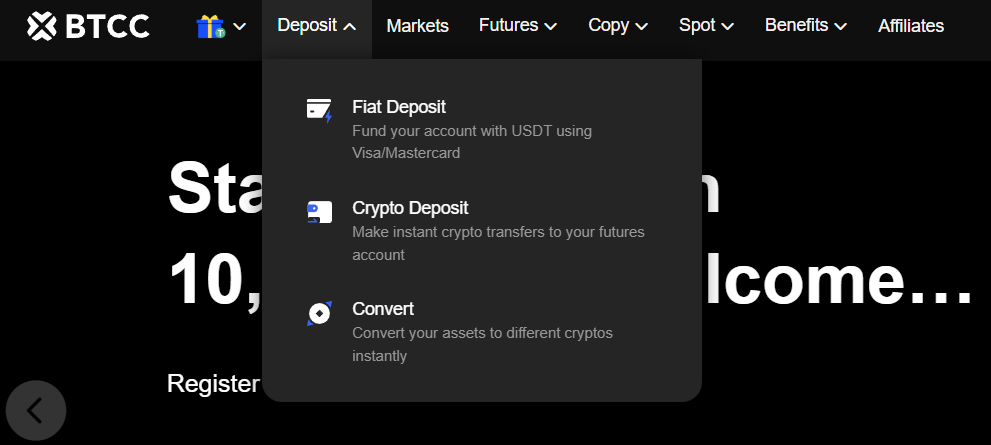
4. Navigating the Trading Interface: Once funded, one can head to the trading section. People can choose between Spot and Futures trading (either USDT-margined or Coin-margined). The interface might look complex for newcomers, but it’s logically organized:
- In the center, there’s a price chart (where one can switch timeframes, indicators, etc.).
- On the right, the order book (buy/sell orders and recent trades).
- Below or to the side, the order entry panel where one can select order type (limit/market/trigger), input quantity, and set leverage.
- Along the top of the order panel, one can pick Cross or Isolated margin, and adjust their leverage slider. It is advisable to always double-check one’s leverage and margin mode before confirming a trade, especially if using high leverage.
- There’s also a handy toggle for Demo or Live mode if an individual wants to practice first.
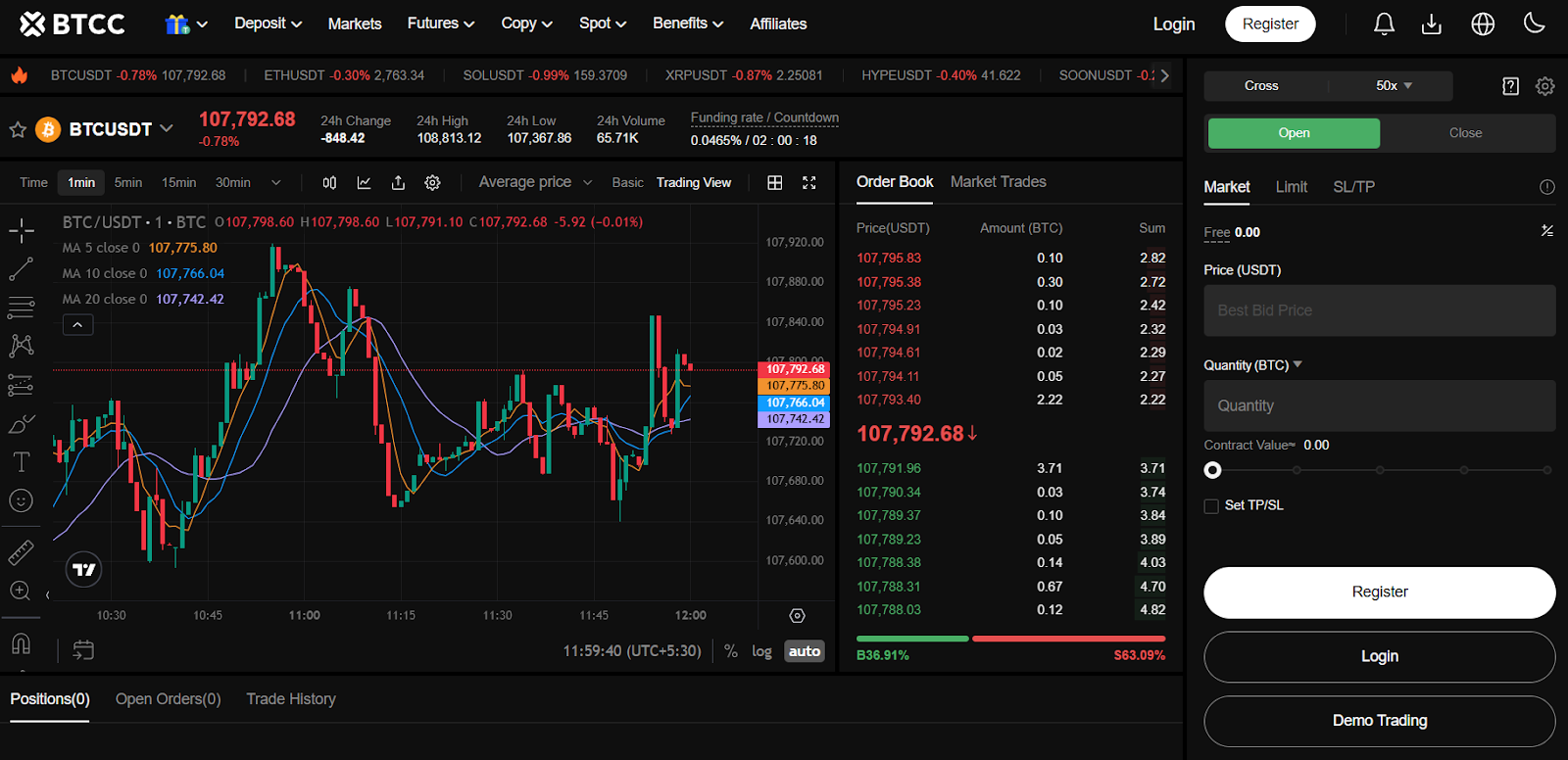
5. Placing an Order: Let’s say a person wants to open a Bitcoin futures trade:
- Select BTC/USDT Perpetual from the list of contracts.
- Choose an order type. Beginners can start with a typical market order for simplicity (buy/sell at current price) while advanced users might use a limit (to set a specific entry) or trigger orders for stop-loss/take-profit automation.
- Enter the quantity. BTCC might denominate contract size in BTC or USDT – e.g., 1 contract = 0.001 BTC or something, which will be indicated. An easier way is often to enter the USDT amount you wish to spend.
- Set leverage. If cross margin is on, leverage might auto-adjust based on position size vs account equity. If isolated, one can pick a number (e.g., 10×, 50×).
- Click Buy/Long or Sell/Short. Confirm the details in the popup and submit.
10% Deposit Bonus for New Users (Welcome Bonus)
Through Whaleportal’s affiliate link, new users can claim a 10% bonus on their first deposit, credited in USDT. The terms are refreshingly simple:
- Deposit at least 500 USDT to qualify.
- Whatever amount is deposited initially, BTCC gives the user an extra 10% of that amount as a bonus (capped at a $10,000 bonus which corresponds to a $100,000 deposit).
- The bonus is credited within about a week of the deposit, often sooner.
- The bonus amount can be used to trade immediately – there are no specific trading volume requirements or “unlock” conditions attached.
- The bonus cannot be directly withdrawn, but any profits made from using it can be.
BTCC vs Other Exchanges
BTCC vs. Bybit
- KYC & Accessibility: Bybit requires KYC for all new users (as of mid-2023 onward) whereas BTCC does not. Moreover, U.S. traders cannot legally use Bybit (as the site geo-blocks access without a VPN), whereas U.S. traders can technically access BTCC (BTCC has a U.S. MSB license) and trade without verification.
- Trading Products: Both exchanges offer spot and a wide array of futures. Bybit has expanded into options, NFTs, and other products, whereas BTCC focuses on core trading (no NFT marketplace or launchpad on BTCC as of now). Bybit and BTCC both offer tokenized stocks/commodities trading with USDT settlement
- Leverage: Bybit typically allows up to 100× on major crypto futures (and only 5× on stock CFDs). BTCC beats this by offering up to 150× or even 500× on crypto futures and 50× on stock futures.
BTCC vs. Bitunix
- No-KYC Policy: Both BTCC and Bitunix do not require KYC for crypto-to-crypto trading. Both allow up to $10k/day withdrawals unverified, and offer increased limits (up to $1M/day) if a verification is done.
- Trading Instruments: Both exchanges offer spot and futures. Bitunix supports ~350+ trading pairs (spot and futures) including many altcoins while BTCC offers ~180+ pairs (fewer altcoins on spot, around 60 futures as mentioned) However, BTCC offers tokenized stocks and commodities, which Bitunix does not. Both have copy trading features.
- Leverage: Bitunix offers up to 125× leverage on futures while BTCC offers up to 150-500× on some futures.
Is BTCC Right for You?
BTCC combines a rare blend of qualities such as a long track record of security and trustworthiness plus cutting-edge offerings like tokenized asset trading and copy trading.
In conclusion, BTCC is absolutely worth considering as anyone’s go to crypto trading platform. It has stood the test of time, avoided any security scandals, and continuously innovated to meet traders’ needs. The ability to trade a variety of assets with no KYC, enjoy a 10% deposit bonus, and do so on a secure, liquid exchange is a compelling proposition.
Frequently Asked Questions (FAQs) about BTCC
Q: Does BTCC require KYC verification?
A: No. For most features, KYC is not required. Investors can deposit crypto, trade, and withdraw up to 10,000 USDT per day without identity verification. That said, KYC’d accounts have a raised withdrawal limit of up to $1,000,000 per day and also have access to certain fiat services and promotions.
Q: Is BTCC allowed in the US and Canada?
A: Technically, yes. BTCC has a Money Services Business license from FinCEN in the US and is registered with FINTRAC in Canada. That said, U.S. regulatory environments are complex and since BTCC doesn’t have specific state licenses (like New York’s BitLicense), availability might vary by state.
Q: What is the BTCC 10% bonus and how do I get it?
A: BTCC’s 10% bonus is a welcome deposit bonus for new sign-ups. If the registration is done through Whaleportal’s affiliate link, signees can get an 10% extra credit in their accounts.
Q: What fees does BTCC charge?
A: BTCC has zero fees to deposit, and withdrawal fees that are standard (e.g., 0.0004 BTC to withdraw Bitcoin)
Q: Is BTCC safe to use now?
A: Yes, BTCC is considered safe and reputable. It’s one of the oldest exchanges (since 2011) and has never been hacked in its history. The platform employs a solid security framework consisting of cold storage (for all funds), mandatory 2FA for withdrawals, anti-phishing measures, and maintaining 152% proof-of-reserves (meaning all customer assets are fully backed and then some).
Q: Can One really trade stocks or gold on BTCC with crypto?
A: Yes. BTCC offers tokenized futures contracts for a variety of stocks (like AAPL, TSLA, AMZN, NFLX, etc.), commodities (Gold, Silver, Oil) and even some forex indices.
Q: What coins are available on BTCC?
A: BTCC offers a wide range, roughly ≈150+ cryptocurrencies when considering spot and futures. On the spot trading interface, users can find all of the top 20 market cap coins alongside many popular altcoins. On the futures side of things, BTCC offers 60+ perpetual swaps including BTC, ETH, XRP, ADA, DOGE, SOL, MATIC, DOT, LTC, SHIB, TRX, AVAX, etc., and even niche ones like PEPE, AI-themed coins, etc.
Q: Does BTCC offer any passive income programs (staking, etc.)?
A: Currently, BTCC does not have staking or yield products on its platform.
Want to start trading Bitcoin, Alt-coins, Gold, Stocks and much more using USDT? Create your account now.